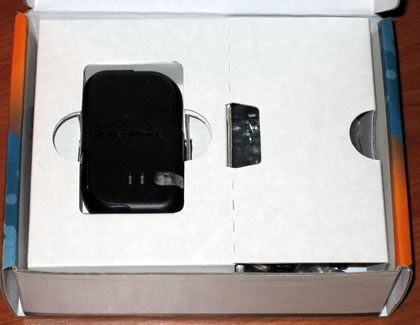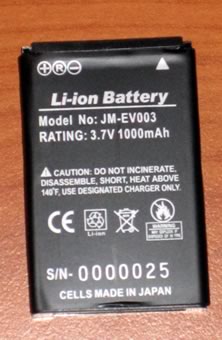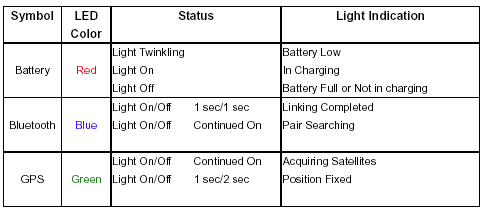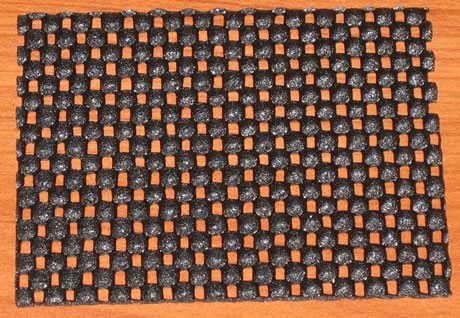1. Introduction
 Evermore is a Taiwaneze manufacturer that produces quality GPS products for all categories of users. SiRF III devices are well known to users for their good reception as well as good overall performance. We had the chance to test the BT-R900, a SiRF III enabled BT GPS device, and compare it with other similar devices. First off, let's see some background information about Evermore.
Evermore is a Taiwaneze manufacturer that produces quality GPS products for all categories of users. SiRF III devices are well known to users for their good reception as well as good overall performance. We had the chance to test the BT-R900, a SiRF III enabled BT GPS device, and compare it with other similar devices. First off, let's see some background information about Evermore.
- Evermore background
Evermore was founded in 1998. Head-quartered at Taiyuan Science Park, Hsinchu, TAIWAN, the company mainly concentrates on
GPS related technology "...EverMore identify itself not just a follower but a customer-oriented leader. We
can meet customer’s requests and changes in the short time by our strong innovation ability and dynamic support teams. EverMore offers the standard and custom-designed products for car navigation, maritime, mapping, land surveying, and so forth..."

- Evermore BT-R900
 The Evermore BT-R900 is a high performance Bluetooth GPS receiver that is both compact and portable. With the BT-R900, you can now add full GPS navigation capabilities to your PDA, smart phone or laptop at minimal cost while enjoying performance that rivals dedicated GPS navigators. By employing the SiRFstarIII chipset, users will enjoy unsurpassed positioning accuracy and performance.
The Evermore BT-R900 is a high performance Bluetooth GPS receiver that is both compact and portable. With the BT-R900, you can now add full GPS navigation capabilities to your PDA, smart phone or laptop at minimal cost while enjoying performance that rivals dedicated GPS navigators. By employing the SiRFstarIII chipset, users will enjoy unsurpassed positioning accuracy and performance.
Powered by Li-ion rechargeable batteries with an impressive battery life, the BT-R900 is as easy to carry around as your mobile phone. Date transmission and connections via Bluetooth eliminate any need for wires, and the Bluetooth transmitter allows GPS data to be transmitted to your PDA, smart phone or any other Bluetooth enabled device within 10 meters. The high-sensitivity GPS receiver will pick up the weakest of signals, allowing you to place it anywhere without compromise, and enabling you to begin navigation immediately with the very fast Time-To-First-Fix.
- Used chipset
The SiRF III chipset has the following specifications:
Chipset: |
SiRF Star III WAAS enabled |
Frequency: |
1, 1575.42 MHz |
C/A code: |
1.023 MHz chip rate |
Channels: |
20 channel all-in-view tracking |
Sensitivity |
Acquisition: -148dBm
Tracking: -159 dBm |
Position Accuracy: |
10 meters, 2D RMS |
~ 5 meters, 3D RMS WAAS |
Velocity: |
0.1 m/s |
Time: |
us synchronized to GPS time |
Default: |
WGS-84 Acquisition Time (Open sky, stationary) |
Reacquisition: |
0.1 sec., average |
Hot start: |
1 sec., average |
Warm start: |
38 sec., average |
Cold start: |
42 sec., average |
Altitude: |
18,000 meters (60,000 feet) max. |
Velocity: |
515 meters/second (1000 knots) max. |
Acceleration: |
Less than 4g |
Jerk: |
20 m/sec |
Protocol messages: |
NMEA-0183 output protocol, Bluetooth Interface Baud Rate 4800bps |
Output format: |
GGA(1sec), GSA(5sec), GSV(5sec), RMC(1sec) |
Operating temperature: |
-20° to 60° C |
Humidity: |
5% to 95% Non-condensing |

Looking at the SiRF III specs, we notice that the chipset is capable of receiving up to 20 satellites (actually 12 maximum), has very low Hot/Warm/Cold start times and its accuracy reaches ~5m when WAAS mode is enabled.
2. Package
For our testing purposes, Polstar Technologies sent us the retail package which includes:
- The BT-R900 GPS receiver
- An AC power adaptor (with USB output)
- A cigarette lighter adaptor (with USB output)
- A mini USB cable (for charging with PC)
- A Li-Ion battery
- A CD with manual and test software
The current price for the product is around US$120.00, as found around the net.


The BT-R900 is very similar to the Globalsat BT-338.

On the front, there is a large LED indicator used for on/off function, and two leds indicating GPS status. At the bottom there is a mini USB port, mainly used for charging.


Removing the battery cover on the back, reveals some general information about the product:

The Li-Ion battery is rated at 1000mAh 3.7V, typical for this category:

The external dimensions are 73x 45x 20mm with a weight of 60gr. The three LEDs indicate the following status conditions:

Also included is an anti-slide rubber mat. You can place the mat on the dashboard of your car to help keep the device from sliding about. However, from our tests in a BWM 320, the device had better stability without the rubber mat. It probably depends upon where you plan keeping it and the type of surface.

3. Installation - Tests
Installation of the device is straightforward. After charging for about 3hours, you can install it on either your PDA or BT enabled laptop. Remember, the pair key is four zeros (0000), in case the application asks for it. All our tests were done with an ASUS A6JA laptop. We recorded all produced data for a pre-selected route with VisualGPSX and later analyzed it with GPSLog.
In order to measure the TTFF tests ("Time to First Fix" which is the time it takes for a GPS to determine its current position), we used GPSInfo "Cold Start" function. All tests ran simultaneously, under the same environmental conditions and all installed in a BMW 320, 2006 model.
According to GPSInfo, the device had 3.1.1 firmware installed, which is the latest for all SiRF III enabled devices..
- Test Day One
The first day we tested the device with a clear daylight sky and 35°C.
|
|
|
|
|
|
|
|
|
|
|
|
|
|
|
|
|
|
|
|
|
|
|
|
Average Signal Level (in dB)
|
|
|
|
|
|
|
The BT-R900 showed good performance with a high 3D Fix % and high Satellites in view count. In comparison however, the BT-338 seems to have better sensitivity with a better 3D Fix % and higher Average Signal Level. Despite the fact that both receivers use the same chipset (SiRF III), there are significant differences in performance, especially for the TTFF times. Despite our efforts, the BT-R900 could not get a first fix in under 85 secs, whereas the BT-338 needed on average 44 sec. This is something that may present problems for users that lose the signal often, as in cases when passing through large tunnels. Other than this however, the device's performance is quite acceptable.
- Test Day two ( Indoor Sensitivity)
We placed both receivers indoors, close to a big window and monitored their performance. The Evermore BT-R900 obtained a 3D fix, having in view 7 and in use 4 satellites, whereas the Globalsat BT-338 also obtained a 3D fix with 7 in view and 5 in use satellites.
- Overall impressions
The Evermore BT-R900 uses the SiRF III chipset, which is usually a guarantee of good reception levels and low TTFF times. Compared with Globalsat's BT-338, the performance was lower in all cases. But the only point for concern is the high TTFF times, almost double those of the BT-338. In all other respects, performance is more than satisfactory for everyday use.
4. Conclusion
 Evermore is a Taiwaneze manufacturer that produces quality GPS products for all categories of users. The BT-R900 is their top of the range product for BT GPS devices, using the SiRF III chipset. The device's performance is sufficient for everyday use. Despite the fact that it didn't quite reach the performance of the Globalsat BT-338 (also powered by the SiRF III chipset), which had higher number of satellites in use and better average signal levels, you won't face any problems in everyday use. If we need to complain about something, it is about the TTFF (Time to First Fix) performance, which was at best, 85 seconds. We expected times to be significantly lower than this. The lack of an external antenna connection, which would be desirable, is typical for this category of device, but there should be no problems here since the device displayed good reception.
Evermore is a Taiwaneze manufacturer that produces quality GPS products for all categories of users. The BT-R900 is their top of the range product for BT GPS devices, using the SiRF III chipset. The device's performance is sufficient for everyday use. Despite the fact that it didn't quite reach the performance of the Globalsat BT-338 (also powered by the SiRF III chipset), which had higher number of satellites in use and better average signal levels, you won't face any problems in everyday use. If we need to complain about something, it is about the TTFF (Time to First Fix) performance, which was at best, 85 seconds. We expected times to be significantly lower than this. The lack of an external antenna connection, which would be desirable, is typical for this category of device, but there should be no problems here since the device displayed good reception.

The retail price (~US$120.00) puts the device in the Globalsat BT-338 category. Both devices are very similar in dimensions and specifications, but there were some differences in real life performance.
The Positive
- SiRF III chipset provides good performance
- Supports WAAS/Egnos
- Small dimensions
- Good retail package
- Includes mini-USB port for charging
- CD with manual and testing software included
- Car charger is included
- Device turns off after 10mins of inactivity
The Negative
- Not as good performance as BT-338
- Doesn't support any automatic power on mode